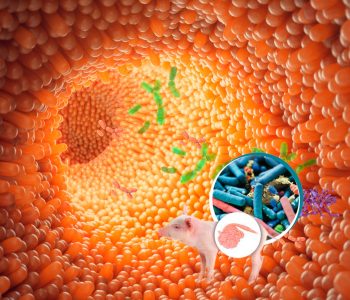With constant changes and the rapid evolution of molecular technologies, the gastrointestinal microbiota of pigs has been studied quite in depth over the last few years. Becoming better known and playing a fundamental role in both animal health and welfare.
| The gut microbiota provides the pig with many functions, including an improved energy-collecting capacity, volatile fatty acid production, vitamin K production, cellulose fermentation, and increased resistance against pathogenic bacteria. |
Interestingly, the gut of newborns before birth is thought to be devoid of microbes. However,it quickly undergoes a remarkable shift from an essentially germ-free state to an extremely dense microbial population which eventually experiences microbial successions, and establishes a microbial community that is similar to that of adults.
Gut microbial composition and the ecological succession of gut microbiota in the first years of life are determined by various complex internal and external factors. For example:
- changes in diet
- the administration of probiotics and prebiotics
- antibiotic supplementation in feed
All of these play an important role in shaping piglets’ gut microbial community.
| Weaning in the early stages of life, represents a significant time of transition and stress for the animals. |
Understanding the dynamics of pigs’ gut microbiota during the transition to weaning is of great interest, as it influences the overall health and growth performance of pigs.
TRANSITION TO WEANING AND MICROBIOTA COMPOSITION
Weaning is an abrupt separation of piglets from the sow, characterized by stressful changes that can contribute to intestinal and immune dysfunctions. Resulting in reductions in both the health status and growth performance of piglets.
[register]
While weaning practices vary among pig producers, weaning age on commercial pig farms has been steadily decreasing. Reaching an age of less than 21 days.
Overall, piglets are exposed to a number of stressors during the transition to weaning. Amongst which the abrupt change in diet from milk to solid plant-based foods is probably one of the most significant impacts during this stage.
The intestinal microbiota of young piglets undergoes a very rapid ecological succession after the induction of several factors during the weaning period.
Changes in the composition of resident commensal bacteria during transition periods in the piglet are known as microbial changes or shifts.
| One of the main factors influencing changes in piglets’ microbiota during weaning is the abrupt shift in diet from simple nutrient sources to more complex sources, which can affect the absorption capacity of the small intestine and is likely to influence growth and feed efficiency. |
The weaning period is critical as piglets are exposed to thousands of new bacterial species, which can play an important role in establishing a similar microbiota to that of adults later in life.
The establishment of a beneficial microbiota is important during the weaning stage because piglets still have an immature immune system and rely on milk from sows to prevent colonization and overgrowth of opportunistic pathogens.
Therefore, it is necessary to have a better understanding of gut microbial succession during the transition to weaning and how various factors influence gut microbial changes in piglets. Evaluating how these associate with improvedgastrointestinal health, growth performance and welfare of piglets.
INFLUENCE ON POST-WEANING INFECTIONS
The weaning period is a crucial stage in the life of pigs, as the gut microbial composition and immune system are still developing, making pigs susceptible to pathogens that lead to post-weaning diarrhea.
Importantly, during the transition to weaning, piglets experience an immediate but transient decrease in feed consumption or anorexia, which contributes to intestinal inflammation.
It is noteworthy that some pathogens within the Enterobacteriaceae family, namely Salmonella enterica serovar Typhimurium and enterotoxigenic E. coli (ETEC), induce intestinal inflammation in pigs that disrupts the composition of the microbiome.
EFFECTS OF THE DIET
The first year of life is important in establishing the intestinal microbiota of animals and is greatly affected by diet.
Several studies reported the effects of dietary change on piglets’ gut microbiome, overall health, and growth performance.
Probiotics are one of the functional foods that link diet and health.
In 2007, Roberfroid defined a prebiotic as “a selectively fermented ingredient that allows specific changes, both in the composition and activity of gastrointestinal microflora that confers benefits on the well-being and health of the host.”
In recent decades, probiotics and prebiotics or their combination (also known as synbiotics) have been the subject of many research studies due to their potential therapeutic and preventive benefits for animal health.
Mechanisms associated with the beneficial effects of prebiotics and probiotics include manipulation of gut microbial communities.
Considering that prebiotics are readily available fermentation sources for probiotics, these can improve the survival of concurrently administered probiotic strains. Resulting in advantages for the host offered by live microorganisms.
Source: Abstract taken and modified from “Guevarra, R.B., Lee, J.H., Lee, S.H. et al. Piglet gut microbial shifts early in life: causes and effects. J Animal Sci Biotechnol 10, 1 (2019).”
[/register]
